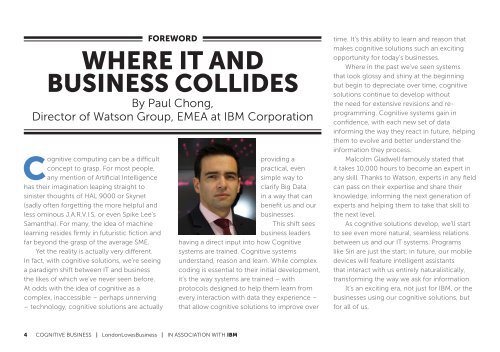COGNITIVE BUSINESS
COGNITIVE-BUSINESS
COGNITIVE-BUSINESS
Create successful ePaper yourself
Turn your PDF publications into a flip-book with our unique Google optimized e-Paper software.
FOREWORD<br />
WHERE IT AND<br />
<strong>BUSINESS</strong> COLLIDES<br />
By Paul Chong,<br />
Director of Watson Group, EMEA at IBM Corporation<br />
Cognitive computing can be a difficult<br />
concept to grasp. For most people,<br />
any mention of Artificial Intelligence<br />
has their imagination leaping straight to<br />
sinister thoughts of HAL 9000 or Skynet<br />
(sadly often forgetting the more helpful and<br />
less ominous J.A.R.V.I.S, or even Spike Lee’s<br />
Samantha). For many, the idea of machine<br />
learning resides firmly in futuristic fiction and<br />
far beyond the grasp of the average SME.<br />
Yet the reality is actually very different.<br />
In fact, with cognitive solutions, we’re seeing<br />
a paradigm shift between IT and business<br />
the likes of which we’ve never seen before.<br />
At odds with the idea of cognitive as a<br />
complex, inaccessible – perhaps unnerving<br />
– technology, cognitive solutions are actually<br />
providing a<br />
practical, even<br />
simple way to<br />
clarify Big Data<br />
in a way that can<br />
benefit us and our<br />
businesses.<br />
This shift sees<br />
business leaders<br />
having a direct input into how Cognitive<br />
systems are trained. Cognitive systems<br />
understand, reason and learn. While complex<br />
coding is essential to their initial development,<br />
it’s the way systems are trained – with<br />
protocols designed to help them learn from<br />
every interaction with data they experience –<br />
that allow cognitive solutions to improve over<br />
time. It’s this ability to learn and reason that<br />
makes cognitive solutions such an exciting<br />
opportunity for today’s businesses.<br />
Where in the past we’ve seen systems<br />
that look glossy and shiny at the beginning<br />
but begin to depreciate over time, cognitive<br />
solutions continue to develop without<br />
the need for extensive revisions and reprogramming.<br />
Cognitive systems gain in<br />
confidence, with each new set of data<br />
informing the way they react in future, helping<br />
them to evolve and better understand the<br />
information they process.<br />
Malcolm Gladwell famously stated that<br />
it takes 10,000 hours to become an expert in<br />
any skill. Thanks to Watson, experts in any field<br />
can pass on their expertise and share their<br />
knowledge, informing the next generation of<br />
experts and helping them to take that skill to<br />
the next level.<br />
As cognitive solutions develop, we’ll start<br />
to see even more natural, seamless relations<br />
between us and our IT systems. Programs<br />
like Siri are just the start; in future, our mobile<br />
devices will feature intelligent assistants<br />
that interact with us entirely naturalistically,<br />
transforming the way we ask for information.<br />
It’s an exciting era, not just for IBM, or the<br />
businesses using our cognitive solutions, but<br />
for all of us.<br />
4 <strong>COGNITIVE</strong> <strong>BUSINESS</strong> | LondonLovesBusiness | IN ASSOCIATION WITH IBM


